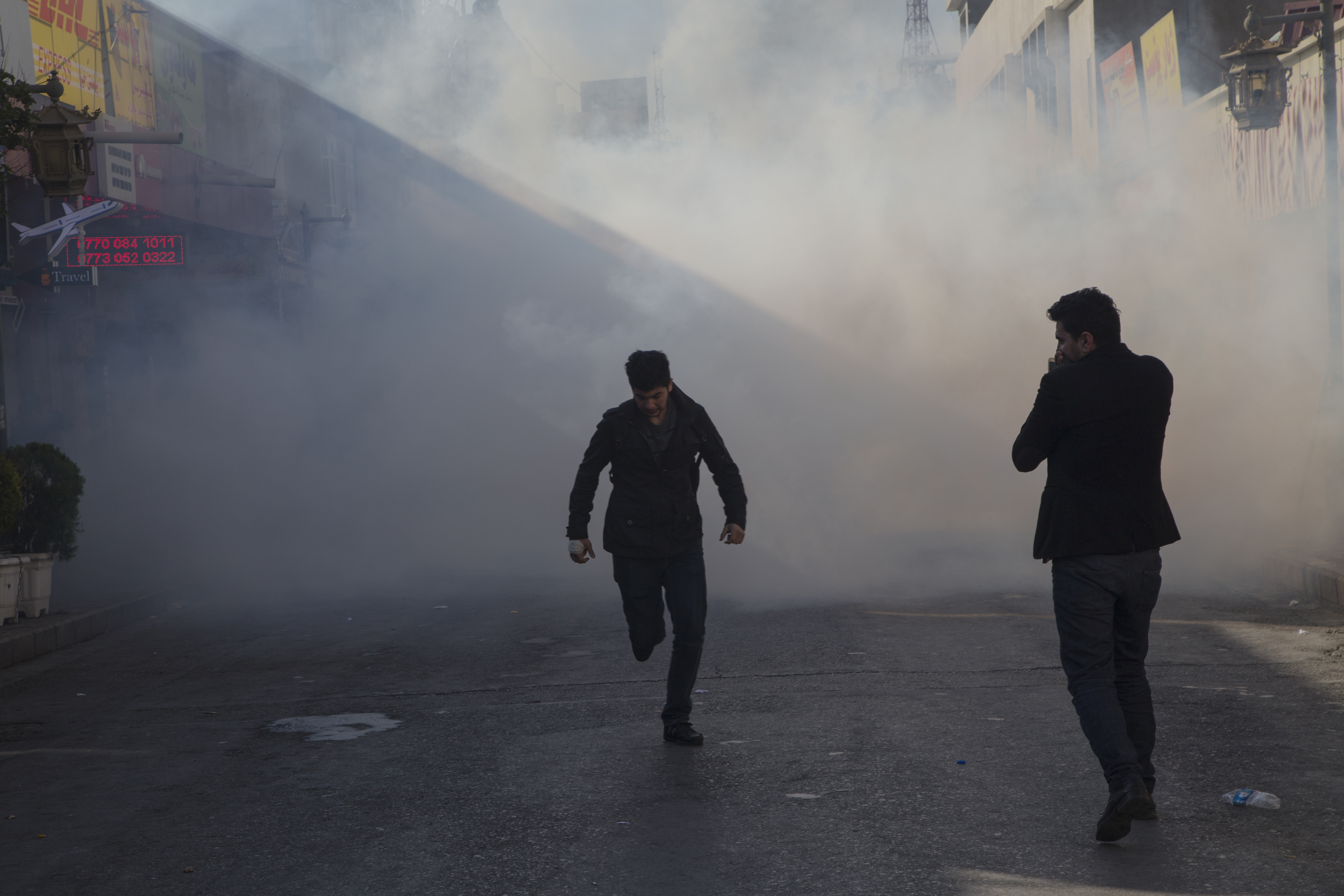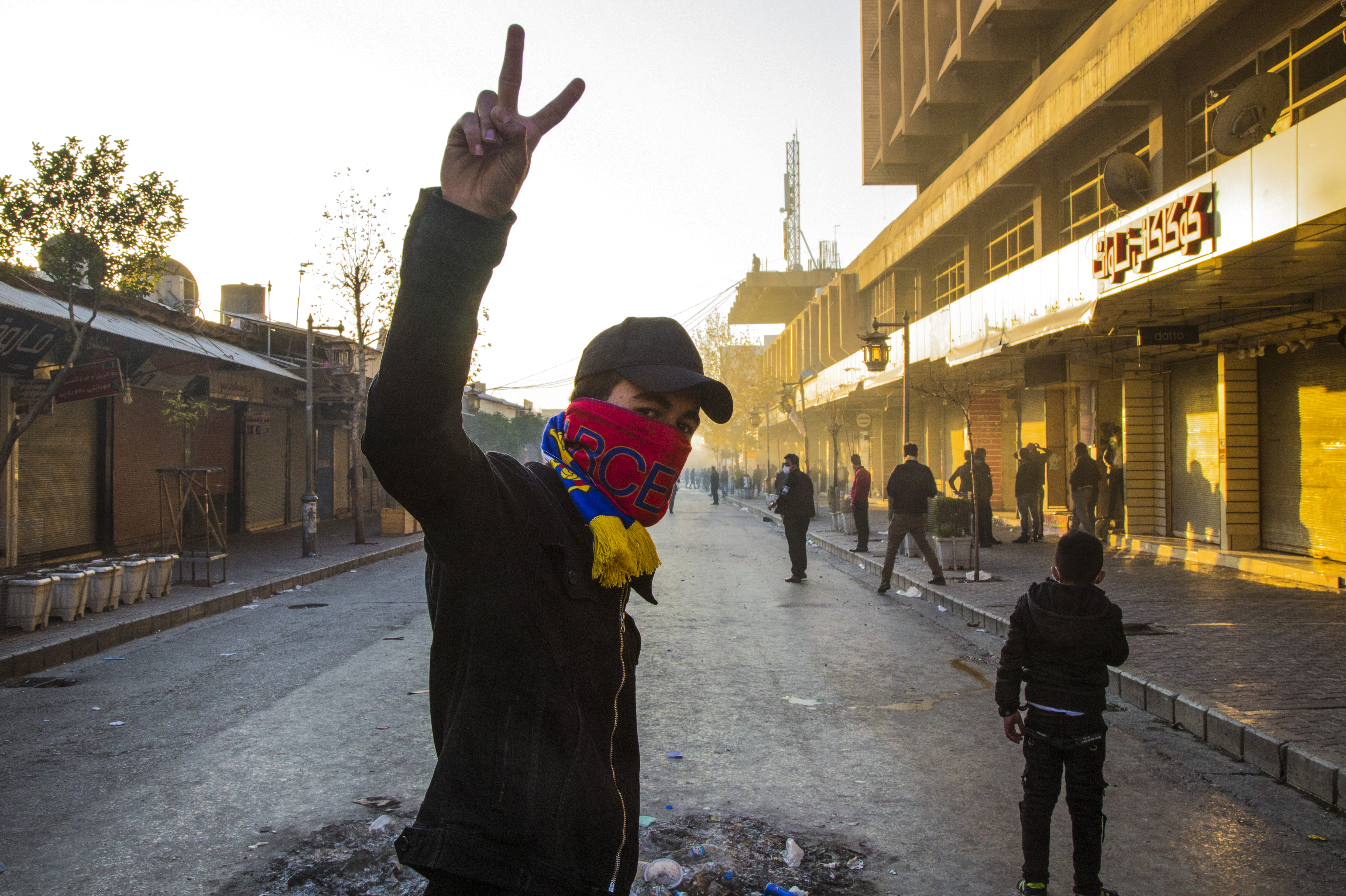While Baghdad, the capital of Iraq, boils, Erbil, the capital of its region, is silent. The social uprisings in central and southern Iraq have been transformative for the country but the protests did not spill over into the Kurdistan Region of Iraq (KRI). Yet, taking a stand to support or oppose the uprisings might be inevitable.
The Iraqi and the Kurdistan Region analysts identify several factors preventing the spread of protests from Baghdad and other Iraqi governorates to the Kurdistan Region. In particular, these include strict measures imposed by the security forces, legal obstacles to demonstrations, and the use of coercion, threats, and violence (including assassinations) in past demonstrations held in the region.
Meanwhile, the absence of a strong and galvanizing opposition party to mobilize dissatisfied people and the presence of a strong, concentrated political authority, analysts claim, are the other significant contributing factors. Nevertheless, many believe that is only the matter of time before there are protests in the Kurdistan Region.
But some of the circumstances that led to months-long demonstrations in Baghdad and the other southern provinces are perhaps more severe in the KRI, including the long delay of the distribution of civil servants’ salaries. The Kurdistan Regional Government (KRG) has yet to provide salaries of the first four months of 2020 due to constant paycheck delay since 2014.
It tells us that the situation is ripe for demonstrations but the lack of organizations and leadership that is trusted by the people is one of the primary reasons that the protests in Baghdad have not spread to the region
“I believe the extent of the grievances of the KRI’s citizens is greater than that of the people of Baghdad. People’s lives depend on salaries, but the region delays salary payments. The KRG misses three to four salary payments every year,” said Shorsh Hassan, a lecturer at the Department of Political Science at the University of Sulaymaniyah, “It tells us that the situation is ripe for demonstrations but the lack of organizations and leadership that is trusted by the people is one of the primary reasons that the protests in Baghdad have not spread to the region.”
The social uprisings in Baghdad and the other provinces that began in October 2019 are ongoing. The protests were initially against lack of jobs and services and rampant corruption but later, demands grew for the dissolution of the government, an overhaul of the current political system, and early elections and have led to the resignation of the outgoing Prime Minister, Adil Abdul-Mahdi. But such achievements have been costly for the protestors, with at least 600 killed so far.
Baghdad, numerous women protestors chant against the government at the Tahrir Square, the stronghold of the protestors., 2020. Photo: KirkukNow
Niyaz Abdullah, a prominent feminist and activist for civil liberties in Erbil, says that the main reason these demonstrations have not sparked protests in the Kurdistan Region is the “oppressive measures” taken by the KRG’s security forces.
“The ninth cabinet of the KRG very sensitively deals with the critical voices and measures now are very strict… it oppresses those who try to demonstrate and call for demonstrations.”
It oppresses those who try to demonstrate and call for demonstrations
The three-consecutive arrests of journalist Hemn Mamand by Erbil security forces is perhaps the best example of these tough security measures.
Last month, Mamand called upon teachers and public employees to defy orders to remain indoors and to take to the street to demonstrate against the delay of their paychecks. His call came at a time when the KRG had announced a full- scale curfew to prevent the spread of the novel coronavirus.
Soon after, the KRG attorney general issued a warrant and Mamand was arrested. He was released on bail on the evening of March 26, but immediately after his release, Mamand was again detained following a complaint filed by the KRG Prime Minister Masrour Barzani.
Abdulla believes that the delay of salaries for 50 to 60 days and the lack of public services has put people on edge but “people and civil society activists are threatened and coerced, which is the reason for the lack of protest organization.”
People and civil society activists are threatened and coerced, which is the reason for the lack of protest organization
Hassan, a lecturer in political science, agrees with Abdullah; power is more centralized in the KRI and measures against the critical voices are tougher, so authorities are able to control the situation.
The Kurdistan Region experienced two waves of protests from 2011 to 2015 against the regional government and its dominant parties. However, the security forces of the two ruling parties, Kurdistan Democratic Party (KDP) and Patriotic Union of Kurdistan (PUK) suppressed the demonstrations, resulting in many deaths and hundreds of injuries.
Dr. Wasq Hashmi, a political scientist from Baghdad (who died two days after his interview with KirkukNow), believed that the existence of “a strict, centralized authority in the Kurdistan Region” has had a dampening effect on the organization of protests, as exemplified by the February 2011 protests.
10 people were killed by bullets fired by security forces and more than 200 demonstrators were injured in the 2011 demonstrations, which lasted two months.
Although the demonstrations gave impetus to the issuance of several decisions by the government and the parliament to address the demands of the protestors, the decisions were not implemented.
Are the laws facilitators or obstacles?
The KRI parliament has recognized the legal and constitutional right to protests, yet activists consider the law as the barrier to organization.
According to the Law Number 11 of 2010 for Organizing Protests in the Kurdistan Region-Iraq, demonstrations are not permitted unless an application for a license is submitted 48 hours in advance and includes the names of the organizers, their signatures, the location of the protest.
If during the protest, stability, the general order or the public morality is corrupted, or if public or personal property is destroyed, those responsible for causing the harm shall compensate the loss and will face legal consequences
The statute also provides that government ministers and local authorities have the power to reject the application if the protest would be “detrimental to order and public morality,” adding that “if during the protest, stability, the general order or the public morality is corrupted, or if public or personal property is destroyed, those responsible for causing the harm shall compensate the loss and will face legal consequences.”
Unlike the KRG, The Iraqi government has yet to adopt “The Law of Assembly,” and a number of regulations under other laws govern permissions to organize protests.

Sulaymaniyah, a protestors run from the smokes of tear gas, 2015. Photo: Zmnako Ismail
According to the Iraqi government protocols regulating the organization of demonstrations, organizers must be identified and government officials notified of the date and location 24 hours prior to the demonstration. No government authority may participate in protests.
Article 38 of the Iraqi constitution guarantees freedom of assembly and peaceful demonstration on the condition that it “does not violate public order and morality.”
The law of “Freedom of Expression and Peaceful Demonstration” has been on the agenda for debate in the Iraqi Council of Representatives since 2014 but it has yet to be passed by parliament.
According to the Universal Declaration of Human Rights “Everyone has the right to freedom of opinion and expression; this right includes freedom to hold opinions without interference and to seek, receive and impart information and ideas through any media and regardless of frontiers.”
Everyone has the right to freedom of opinion and expression
KirkukNow learned that in the last two years, dozens of requests to organize peaceful protests in the Kurdistan Region have been declined.
In February, the New Generation’s (NG) movement request to organize demonstrations in Erbil and Duhok was refused “because the situation was not suitable.”
The NG attempts to organize demonstrations against the lack of public services, unemployment, and delays in salary payments coincided with the social uprising in the southern provinces including Baghdad, which resulted in the resignation of the prime minster, the dissolution of the provincial councils, and parliament resolutions enacting reform and creating job opportunities.
Baghdad, a number of protestors are taking a rest at the Tahrir Square, 2020. Photo: KirkukNow
Kawa Abdulkadir, head of the NG bloc in the Kurdistan Region parliament, said, “we formally submitted the request to organize demonstrations, but the request was declined on the pretext that the situation was not suitable. [The government] even deployed significant number of forces to the places where we decided to protest.”
We formally submitted the request to organize demonstrations, but the request was declined on the pretext that the situation was not suitable
The rejection of such a request came at a time when Nichervan Barzani, President of KRI, and the Council of Ministers had announced their support for the protests in the southern provinces.
Although NG’s application for a license was approved in Sulaymaniyah and a demonstration was arranged, it lasted only one day and with a low turnout.
Niyaz Abdulla states that the reason for the low turnout is that people have lost confidence in the opposition because opposition parties have declined to lead them.
“There is fear that the opposition parties will use the demands of the street to push their own agendas as happened in the previous demonstrations and which resulted in peoples’ disillusionment with protests.”
Baghdad and Erbil, no cooperation for demonstrations
Above all, the shared concerns of the people in the southern and the KRI have not laid the groundwork for any significant level of mutual cooperation to organize nationwide demonstration in the country.
There has been no attempt at any time to move the demonstrations to the Kurdistan Region
As Ali Meqdam, an activist in Baghdad, explained to Kirkuk Now, “there has been no attempt at any time to move the demonstrations to the Kurdistan Region, but here has been moral and logistical support from the region to the protestors in the southern provinces including Baghdad. Some of the injured protestors were transported to the Kurdistan Region.”
Meqdad said he has left Baghdad due to the threats he received from the armed groups.
“The economic situation and service delivery is better in the Kurdistan Region than in the southern provinces, which is why the southern demonstrations have not moved to there.”
In the past week, several dissenting voices and demonstrations have emerged in the Kurdistan Region protesting the salary delays but it is still unclear whether protests like those in Baghdad will reach the Kurdistan Region.
People’s discontent in the KRI might be on the rise due to the paycheck delay, but still the “spark of demonstration might be the matter of time.”
Baghdad, a young protestor has created a mask from a water bottle for protecting himself from tear gas, 2020. Photo: KirkukNow
Kawa Abdulkadir said, “the number of people boycotting the previous elections was not insignificant, meaning they are dissatisfied and disappointed… what is happening now is waiting for opportunities.”
Many of those who spoke to KrikukNow believe that it is just a matter of time before protests emerge in the region.
Niyaz Abdullah believes that right now, there is only individual opposition and dissent and it is necessary for those voices to come together to achieve influence.





